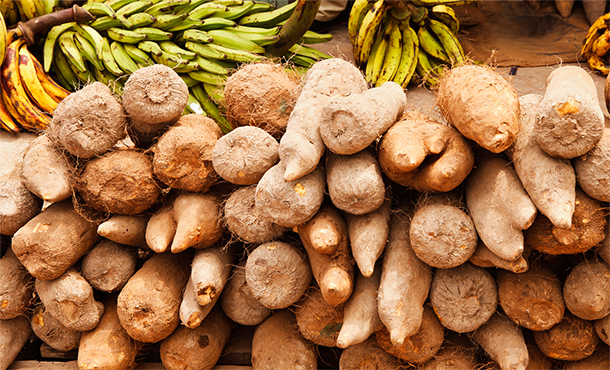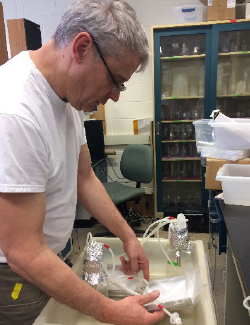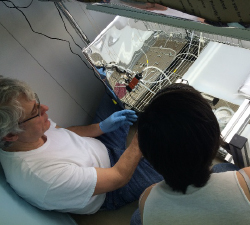
Wayne Curtis, professor of chemical engineering, is combining his love of plants and expertise in engineering to improve agricultural practices around the world. As part of a collaborative grant, Curtis is working to assist African farmers with the production of agricultural food staples - specifically yams, cassavas, and bananas.
Growing ties and feeding nations
11/07/2016
Agriculture and chemical engineering may seem like two divergent areas of study, yet Wayne Curtis, professor of chemical engineering, has found a niche in combining the two that may offer the potential to aid an entire population.
Curtis, who has been a faculty member in the Department of Chemical Engineering for the past 27 years, has dedicated his career to the study of bio-product engineering, which combines his love of agriculture and botany with his expertise in the production of chemical commodities. Recently, he was awarded funding through a collaborative grant issued by the National Science Foundation’s Basic Research to Enhance Agricultural Development (BREAD) program, in which he will have the opportunity to use his skill set to assist African farmers with the production of agricultural food staples.
The grant, titled “Advancing Technologies to Get Improved Yams in Farmers’ Hands,” is sponsored by the Bill and Melinda Gates Foundation— the world’s largest private philanthropic organization that seeks to improve the quality of life for individuals around the world. It aims to institute low-cost plant propagation technology to improve the cultivation of African yams (the region’s most economically-relevant cash crop) and promote greater economic and food security, particularly in Africa. The proposed work also includes intermediate research for cassavas (tapioca) and bananas, which may have the potential to benefit millions more around the globe.
“I have always felt a strong desire to improve agriculture practices and help sustain food supplies throughout the world,” said Curtis. “Whether that need is in my own backyard or in an African village, the end goal is not that different. I feel it is my obligation to use my skills to fulfill a greater need in society—wherever that may be.”
The inspiration for Curtis’ most recent endeavor was sparked during an annual meeting of the Society for In Vitro Biology, a community that specializes in the study of cells, tissues, and organs of both plants and animals. At that time, he was introduced to the work of Morufat Balogun, senior lecturer and tissue culture specialist at the University of Ibadan, Nigeria, and the two became involved in a project designed to propagate chocolate trees. After discussing shared interests and a need for agricultural aid and intervention in Africa, the duo teamed with Leena Tripathi, plant biologist at the International Institute of Tropical Agriculture, who is based in Nairobi, Kenya, and the project was born.
“One of the most interesting aspects of the BREAD grant has been the concept of community that the Gates Foundation has encouraged. When my team was notified that we had been awarded funding, we were invited to attend a convening that included contributors from all over the world. It was a great opportunity to meet critical members of our team and start discussions with other teams related to the overall food security initiative,” said Curtis.
Curtis’ work on the project focuses on developing low-cost methods of cultivating African root crops by creating reactor systems and leveraging molecular biology techniques. Currently, African farmers are faced with a myriad of obstacles when growing crops that include factors such as drought, dormancy, soil nutrient deficiencies, pests, and disease. Curtis will work to induce cultivation of superior plants by a process known as somatic embryogenesis, which denotes the generation of plant embryos from somatic cells rather than seeds or pollen.
“The easiest way to think about somatic embryogenesis is to take a plant [leaf, root, petal, etc.] and give it biochemical instructions on how to become a new plant; this can be done at the cellular level. We will be taking cells and turning them into baby embryos just like a seed, which will eventually create a system to propagate disease-free plants,” explained Curtis.
The major difference between previous research and Curtis’ current approach is the strong engineering perspective that he and his team will contribute. Rather than focusing on standard tissue culturing practices, they will implement precise control over the plants’ physical, chemical, and biological environment to ensure that mass propagation is scalable, and thereby, successful.
Other factors unique to the project include the open source website dioscorea.org, that was developed as part of the grant as a place for farmers, researchers, and other stakeholders interested in yam propagation to interface and share resources. In addition, a distinct aspect of the project is the amount of undergraduate research support and enthusiasm it has received. Curtis notes that since the inception of the relatively young project, over a dozen undergraduate researchers have contributed their time and ideas.
As the grant develops over the next three years, Curtis plans to travel to Africa (both Kenya and Nigeria) approximately half a dozen times to study crops on site and set up training workshops to teach local farmers about new methods and techniques.
“Ultimately, my goal is to get these methods into the hands of African farmers,” he said. “My hope is that the work will lead to enhanced crop production, gains in economic prosperity, and an overall improvement to the lives of people around the world.”



 Curtis and undergraduate researcher Morgan Shires set up Manual Hy-TIB reactors in environmental chamber for plant growth.
Curtis and undergraduate researcher Morgan Shires set up Manual Hy-TIB reactors in environmental chamber for plant growth.
